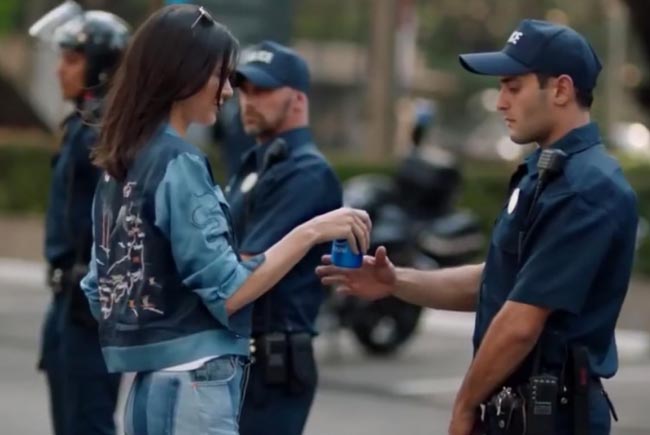How to address the challenge of brand safety in influencer marketing

Partner Content
Lucy Michaeloudis, Content and Community Manager at Upfluence, the leading all-in-one influencer marketing platform, demonstrates key ways of keeping your brand safe in your influencer campaigns and how to look out for red flags.
Influencer marketing helps brands to reach new audiences and drive sales thanks to authentic and engaging content, yet allowing a creator to speak on behalf of your brand isn’t without risk.
While there’s a lot to gain from successful influencer partnerships, we all remember headlines about the backlash following Kendall Jenner’s appearance in Pepsi’s ad (pictured, above) where she becomes the ‘heroine’ of a protest.
Or the case of Luka Sabbat, an influencer hired for $60,000 to promote Snap’s Spectacle glasses on Instagram during Paris Fashion Week. But, after failing to deliver all the content asked for, the campaign ended in a lawsuit.
In an age where trust and transparency are crucial to making sales, brands can’t afford to compromise on brand safety.
It’s not surprising that according to Influencer Marketing Hub, 76% of marketers recognise brand safety as a concern in influencer marketing. This shows that without proper safeguards, an influencer marketing campaign can turn sour, ruining a brand’s reputation and costing them large sums of money.
Even beyond celebrity influencer fails, working with influencers who aren’t fully aligned with your values can also be detrimental for your brand.
However, there are concrete ways that advertisers can address these challenges and create effective working partnerships with influencers.
Know how to identify authentic and trustworthy influencers
To get the most value from their partnerships, brands should select creators based on natural brand affinity, shared values, and how well they can authentically represent the brand.
Marketers need to do their due diligence. This involves looking at influencers’ previous campaigns, evaluating their content style, and researching them in the press. You’re looking to see if they’re a good fit for your brand, i.e. if you’re a vegan skincare brand you don’t want to work with influencers who’ve promoted leather handbags in the past!
Look at the type of content they post, and the language they use, is it compatible with your brand? Remember, their candid online presence should be an asset you can leverage to authentically promote your business.
Look out for red flags before signing an influencer contract. Is the influencer responsive? Are they willing to agree to your terms? Are they willing to share performance insights? If they’re proving too demanding or difficult to work with right off the bat, then it’s probably a sign of trouble ahead.
Use influencer briefs and contracts
As the influencer marketing industry matures, influencer contracts are becoming more commonplace. They’re an important lever to protect both brands and influencers by setting out expectations, compensation, as well as clauses for cancellation, and failure to deliver content. They allow brands to address exclusivity and compliance while ensuring influencers are fairly compensated.
By setting out the working agreement in writing, a contract reduces risks for both parties and lays the foundation for a transparent and successful partnership. Contracts are an important step in the professionalisation of influencer marketing, where influencers should be treated as freelance service providers. With clauses for content approval and timelines for delivery, they can be a key safeguard for brand safety.
Influencer briefs allow brands to get really specific about their expectations, key messages, and dos and don’ts. They can specify keywords to use (and ones to avoid), and give instructions for content production, ensuring both parties are on the same page.
It is up to brands to decide how much creative freedom they want to allow in their brief. If their industry is subject to strict advertising regulations such as alcohol or CBD products then in the interest of brand safety they might create a stricter brief. Most brands however, will benefit from giving some room for creative freedom as influencers are experts in creating authentic content that will engage their audiences.
With the right approach, brand safety can be embedded into your influencer marketing strategy. Choosing the right influencers and nurturing those partnerships well is the best way forward. Remember, keep communication open, and don’t ignore any red flags!
Upfluence is the leading all-in-one influencer marketing platform which provides recommendations, manages partnerships and tracks performance of campaigns. Mediatel is partnering with Upfluence to help maximise your influencer campaigns; contact us to find out more.




